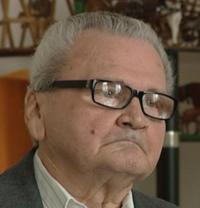“All the citizens, our acquaintances and relatives perceived it very badly. Until then, ceding the land was absolutely unimaginable for us.”

Download image
Július Molitoris was born in 1927 in the village of Klenovec. He comes from the woodsman family. His brother Vladimír was a doctor. Július lived in Hnúšťa, but he enrolled at the public elementary school in Klenovec in 1933. In 1935 his father died and then they moved to his grandparents to Klenovec. In 1938 he left for Veľká Lomnica to learn German language, because he longed for studying at grammar school. In autumn 1938 he started to study at the grammar school in Rimavská Sobota, where he lived with one Hungarian family. For the first time he felt a whiff of intolerance from the side of his Hungarian classmates. This tension came mainly from the political situation and mobilization that had already been declared. Mr. Molitoris experienced occupation of southern Slovakia after the Vienna Award; he also witnessed expelling Slovaks from their homes and taking over Rimavská Sobota. Later he worked as a journalist and correspondent and still tried to find some information about the fate of his family after the Vienna Award.
